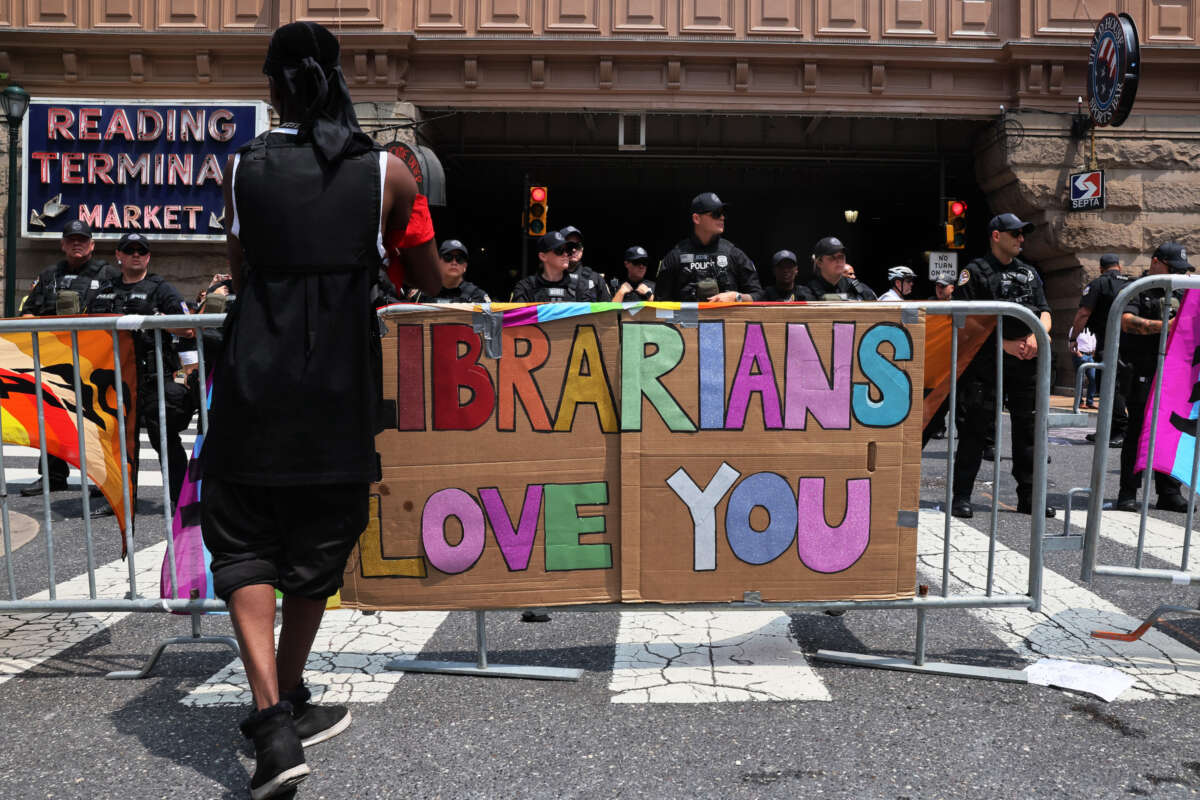Honest, paywall-free news is rare. Please support our boldly independent journalism with a donation of any size.
In suburban Atlanta on August 17, the Cobb County School District voted 4-3 to dismiss Katie Rinderle, a fifth-grade teacher, for reading the Scholastic-approved book “My Shadow Is Purple.” This decision contrasts with a prior ruling by a district tribunal, which cleared Rinderle and recommended against her termination. Georgia and several other states have enacted laws this year restricting youth access to LGBTQ+ materials, including books, art, and other forms of expression. In Rinderle’s case, her firing was attributed in part to the district’s finding that the book “considers gender beyond binary.”
The book is a Scholastic-approved book recommended for lower primary schools. The book is authored by Scott Stuart, who describes the book as “celebrating authentic identity, whether your true to yourself journey is about gender or just being brave enough to step out of other people’s expectations.” Because of new state laws and local district policies, however, teachers are restricted from teaching “divisive concepts,” which Rinderle has called “intentionally vague.”
Upon discovering Rinderle’s decision to read the book to her class, the school district convened a tribunal. Attorneys representing both the district and Rinderle examined the book closely, concluding that it “considers gender beyond binary,” due to the “use of they/them pronouns.” However, they did not advocate for her dismissal. The ultimate decision regarding her employment rested with the full board, which voted 4-3 along party lines to let Rinderle go.
See this page from the findings of the tribunal:

Teachers have increasingly been targeted over anti-LGBTQ+ laws and their jobs, threatened. Earlier this year, a Florida teacher was fired for indicating that she was LGBTQ+ to her students in response to an open discussion. Another Florida teacher was forced to resign after screening a Disney movie that has a gay character in it. A South Carolina teacher was fired over reading an article that discussed gay people.
This comes on the heels of many states passing laws that allow for the challenging of books in schools and libraries. Eleven states explicitly censor LGBTQ+ topics in the classroom. According to PEN America, a free speech advocacy orgnaization, 1,477 books have been challenged this year over “sensitive material,” often related to sexual orientation or gender identity. Though the majority of these bans happened in just five states (Florida, Missouri, South Carolina, Texas, and Utah), school districts in at least 32 states have banned books.
Exposure of youth to LGBTQ+ themes is increasingly under siege. Earlier this year, lawmakers in West Virginia attempted to pass a law aimed at banning “transgender exposure” to youth, but it did not gain traction. In Montana, there was a push to amend a bill to ban “acts of transgenderism” online for youth, that likewise failed to pass. Florida’s controversial expansion of the “Don’t Say Gay” policy led to a memo that states teachers will be fired if they use pronouns or honorifics different from their birth-assigned sex. These moves collectively amount to an attempt to push LGBTQ+ people out of public life.
Rinderle’s battle appears far from concluded. She retains the option to appeal to the State Board of Education and is said to be “weighing her next steps.” Her dismissal, however, is poised to cast a shadow over educators throughout Georgia, likely discouraging the discussion of LGBTQ+ topics in classrooms. While the Georgia law hasn’t faced legal scrutiny yet, situations like Rinderle’s could certainly pave the way for such challenges. In the interim, teachers grapple with an ambiguous law and the looming possibility of job loss for addressing LGBTQ+ subjects in their lessons.
This piece was republished with permission from Erin In The Morning.
A terrifying moment. We appeal for your support.
In the last weeks, we have witnessed an authoritarian assault on communities in Minnesota and across the nation.
The need for truthful, grassroots reporting is urgent at this cataclysmic historical moment. Yet, Trump-aligned billionaires and other allies have taken over many legacy media outlets — the culmination of a decades-long campaign to place control of the narrative into the hands of the political right.
We refuse to let Trump’s blatant propaganda machine go unchecked. Untethered to corporate ownership or advertisers, Truthout remains fearless in our reporting and our determination to use journalism as a tool for justice.
But we need your help just to fund our basic expenses. Over 80 percent of Truthout’s funding comes from small individual donations from our community of readers, and over a third of our total budget is supported by recurring monthly donors.
Truthout has launched a fundraiser to add 460 new monthly donors in the next 8 days. Whether you can make a small monthly donation or a larger one-time gift, Truthout only works with your support.
